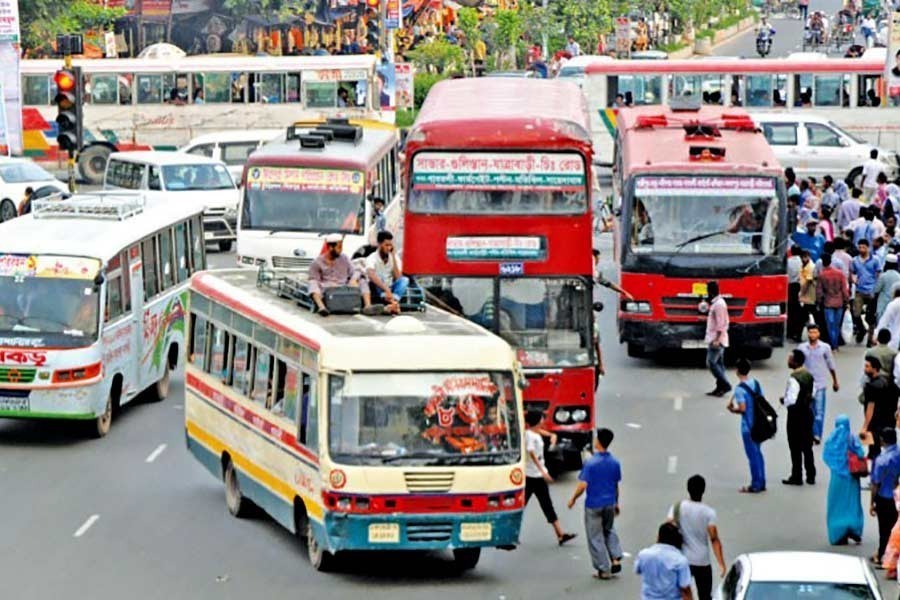
Published :
Updated :

After a series of hard restrictions, the government has favoured gradual return of normalcy by reopening almost all sectors except educational institutions. The pandemic compelled the government to impose several restrictions or lockdowns again and again in the last one and a half years. Though the effectiveness of the lockdown always comes under question due to vast informal economic activities and high population density, apparently, there were few options for the government. Nevertheless, there is no doubt that the restrictive measures have helped contain the spread of the virus to some extent.
It is, however, visible that the optimal outcome of the restriction or lockdown was not achieved. Some sectors bear the brunt of lockdown severely and the public-transport sector is one of those. It is also partially reflected in the official statistics. The ''transport, storage & communications'' sector registered 3.67 per cent growth in FY20 against 7.190 per cent in FY19. The sharp decline in growth was due to Covid-related restrictions. However, the Bangladesh Bureau of Statistics (BBS) provisionally estimated that the sector would grow by 6.07 per cent in FY21. The sector's contribution to the country's Gross Domestic Product (GDP) was, however, almost static at 11.0 per cent in the last three years.
Public transport operators, bus owners to be precise, claimed that their daily revenue loss was Tk 5.0 billion due to the lockdown. The figure may be a guess estimate but not entirely unrealistic. Transport workers suffered the most as they don't get any support from the owners or trade unions. Bangladesh Road Transport Workers Federation, infamous for its role to resist any move to fix the sector and bring discipline on the road, did not stand beside the workers. However, the federation and three other associations related to the transport sector demanded food and financial aid to workers, Tk 50 billion stimulus package, and a waiver of interest on bank loans to revive the sector.
As the bus sector is the backbone of public transport services in urban areas, it required a planned economic stimulus package to continue its operation smoothly. Weakening the sector will damage mobility and accessibility for the mass people in urban areas, especially in the big cities. The Covid-19 has already caused tough economic hardship due to losses of jobs and an increase in the cost of living. Hike in bus fare further pushed up the price and made public transport unaffordable to lower-income people. In Dhaka, most bus users are ''captive users'', meaning that they cannot afford anything else for their daily commuting. The fare hike of bus also compels more people to walk long distances in bad traffic conditions.
Moreover, to the dismay of all, ramshackle buses and minibuses dominate the roads in the city. The exteriors of the buses are defaced and worn, and only a few have rear indicator lights. The interior is more terrible--- seats are narrow, floors dirty and some windows are broken. Thousands of daily commuters have no option but to travel in these unclean, polluted and congested buses. Unfortunately, there is still no effective step to replace the buses with new and decent ones. Though the pandemic has underscored the necessity of replacement strongly, the authorities appear indifferent. There is also no initiative to reorient or train the drivers and helpers.
While a planned investment in the public-transport sector has always paid off, this is largely absent in Bangladesh. Instead of fixing the bus-based public transport by introducing decent and green buses, as planned under route franchise, large investments in mega-infrastructure become the priority. Thus the chaos on the road continues and the pandemic failed to bring the much-needed change.


 For all latest news, follow The Financial Express Google News channel.
For all latest news, follow The Financial Express Google News channel.